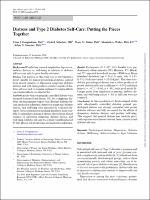Please use this identifier to cite or link to this item:
https://hdl.handle.net/20.500.12202/9362| Title: | Distress and type 2 diabetes self-care: Putting the pieces together |
| Authors: | Gonzalez, Jeffrey S. Hoogendoorn, C. J. Schechter, C. B. Llabre, M. M. Walker, E. A. |
| Keywords: | Psychological distress Depression Diabetes distress Well-being Self-care behavior Type 2 diabetes |
| Issue Date: | 2021 |
| Publisher: | Oxford UP |
| Citation: | Hoogendoorn, C. J., Schechter, C. B., Llabre, M. M., Walker, E. A., & Gonzalez, J. S. (2021). Distress and type 2 diabetes self-care: Putting the pieces together. Annals of Behavioral Medicine: A Publication of the Society of Behavioral Medicine, 55(10), 938–948. https://doi.org/10.1093/abm/kaaa070 |
| Series/Report no.: | Annals of Behavioral Medicine: A Publication of the Society of Behavioral Medicine;55(10) |
| Abstract: | _Abstract_ _Background_ Conflicting research emphasizes depression, diabetes distress, or well-being in relation to diabetes self-care and risk for poor health outcomes. _Purpose_ The purpose of this study was to test whether a latent variable for general psychological distress derived from shared variance of depression symptoms, diabetes distress, and well-being predicts a latent variable of diabetes self-care and to examine evidence for unique effects once shared effects are adjusted for. _Methods_ Adults with suboptimally controlled diabetes were recruited from the South Bronx, NY, for a telephonic diabetes self-management support trial. Baseline diabetes self-care, medication adherence, depression symptoms, diabetes distress, and well-being were measured by validated self-report. Structural equation modeling specified a latent variable for general psychological distress derived from shared variance of depression symptoms, diabetes distress, and well-being. Diabetes self-care was a latent variable indicated by diet, glucose self-monitoring, and medication adherence. _Results_ Participants (N = 627, 65% female) were predominantly ethnic minority (70% Hispanic; 45% Black) and 77% reported household income <$20K/year. Mean (standard deviation) age = 56 (12) years; A1c = 9.1% (1.9%); body mass index = 32 (8) kg/m2. The latent variable for psychological distress was a robust predictor of poorer diabetes self-care (coefficient = −0.59 [confidence interval = −0.71, −0.46], p < .001) with good model fit. Unique paths from depression symptoms, diabetes distress, and well-being (all ps > .99) to self-care were not observed. _Conclusions_ In this population of disadvantaged adults with suboptimally controlled diabetes, general psychological distress was strongly associated with poorer diabetes self-care and fully accounted for the effects of depression, diabetes distress, and positive well-being. This suggests that general distress may underlie previously reported associations between these constructs and diabetes self-care. |
| Description: | Scholarly article / Open access |
| URI: | https://academic.oup.com/abm/article/55/10/938/5904067#304612414 https://hdl.handle.net/20.500.12202/9362 |
| ISSN: | Online ISSN 1532-4796 Print ISSN 0883-6612 |
| Appears in Collections: | Ferkauf Graduate School of Psychology: Faculty Publications |
Files in This Item:
| File | Description | Size | Format | |
|---|---|---|---|---|
| Gonzalez 2021 Distress and type 2 diabetes kaaa070 OA.pdf | 569.65 kB | Adobe PDF |  View/Open |
This item is licensed under a Creative Commons License

